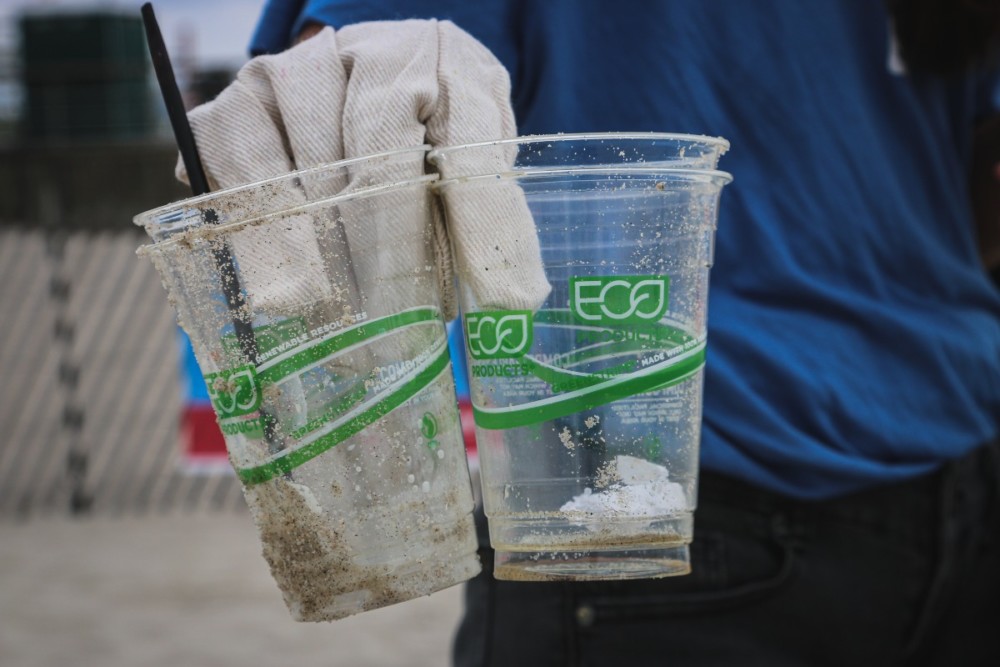
What’s the Deal with Biodegradable and Compostable Plastics?
Now that we’ve established that we have a plastic problem (or several…), let’s delve deeper into possible solutions.
Enter Biodegradable and Compostable Plastics
Biodegradable plastics and bio-based compostable plastics are not new. Biodegradable plastics and polymers were first introduced in the 1980s. Compostable bioplastics, which are derived from renewable biomass sources like vegetable fats and oils, cornstarch, straw, wood chips, food waste, and others, have been used since the 1800s. Both act as sustainable alternatives to many plastics, although with important caveats.
Although “biodegradable” and “compostable” are used as interchangeable terms, it is important to establish that biodegradable plastic and compostable plastic are different, and the difference matters.
Let’s look at both of these types of plastic a little closer:
Biodegradable Plastic
“Biodegradable” means a material can be broken down with the help of microorganisms such as bacteria or fungi or through some other biological process, even without oxygen. Here’s the important part: lots of materials are biodegradable given enough time. Plastic electronics, toxic batteries, and any other material will all eventually breakdown. Plastics are infamous for taking decades or even centuries to break down naturally. To be labeled a biodegradable plastic, there is no set time limit. So it’s important when choosing biodegradable plastic products or packaging to know how long they will take to biodegrade.
Compostable Plastic
Compostable plastics are generally made from renewable raw materials, for example, starch (including corn, potato, and tapioca), cellulose, soy protein, lactic acid, and others. Some, however, are derived from petroleum or produced by bacteria through the process of microbial fermentation.
These plastics can be composted, which is the process of recycling organic waste in order to eventually reuse it. But when it comes to most packaging materials, “compostable” most likely means it needs to be entered into an industrial composting facility. (Note: we do NOT have any industrial compost facilities near Philly.)
This is an important difference. These materials need to be in the right conditions to break down into their components of water, carbon dioxide, and biomass, and they will not always biodegrade in a landfill. Throwing a compostable plastic cup into a landfill, for example, defeats the purpose of it being compostable in the first place. These materials need oxygen, moisture, and sunlight to break down properly, and being buried in a landfill doesn’t meet these requirements.
Bioplastics, similar to biodegradable plastics, can take varying lengths of time to compost depending on their composition, thickness, and the composting conditions they’re placed in. In a commercial composting facility, where materials are ground up, piles are turned, and the necessary higher composting temperatures can be reached, these plastics can break down in 90-180 days. This means that your backyard compost heap cannot break down the majority of compostable plastics.
Lack of Access to Composting Facilities
A 2006 article stated that NatureWorks, an international company that manufactures bioplastics, identified only 113 commercial composting facilities in the United States, and just a quarter of those facilities accepted residential food scraps collected by municipalities. A 2019 survey covered by BioCycle, a magazine and website focused on composting, renewable energy and organics recycling, found 185 full-scale composting facilities. Without the conditions maintained in these scattered facilities, compostable plastics can’t break down. But most consumers don’t have access to commercial composting companies.
This lack of access to proper disposal, alongside a lack of knowledge about the intricacies of the different plastic types, leads to compostable plastics being placed with recyclable plastics or thrown in landfills. Compostable plastic is not recyclable, and in large amounts, it becomes a serious contaminant to recycling facilities that end up paying to separate it from recyclables and dispose of it. If it ends up in a landfill, compostable plastic can take as long as any other plastic to break down, which can take anywhere from 100 to 1,000 years.
So it is absolutely vital we ensure compostable plastic is funneled into the right facilities.
Conclusion
In the end, your best bet to avoid contributing to landfills or plastic pollution is still saying no to plastic and replacing single-use plastics with reusable options made of wood, metal, ceramic, glass, or other materials.
But if you find yourself in a situation where you need to use plastic, opt for the biodegradable option unless you know the compostable plastic option will end up in a commercial composting facility that can meet the necessary requirements for the material to break down.
TLDR
- We have a plastic problem: we use a massive amount of petroleum-based chemicals to produce plastic, and most plastic is thrown away to only take up space in a landfill or pollute the natural environment.
- Biodegradable and compostable plastics provide alternatives to the worst plastics, but they have important differences: Biodegradable plastic breaks down, even in a landfill, but it may take a very, very long time. Compostable plastic can be broken down into compost or humus, but only under certain conditions, which cannot be met when buried in a landfill and most likely need an industrial composting facility.
- For compostable plastic to reach its full potential, we need to increase the availability and accessibility of commercial composting facilities and information clarifying which plastics to recycle, compost, or throw into the landfill.
Want to read more? Take a look at these resources:
- Corn Plastic to the Rescue.
- An Introduction to Biodegradable Plastics.
- The History and Most Important Innovations of Bioplastics
- Compostable Plastics.
- Biodegradable vs. Compostable vs. Oxo-Degradable Plastics.









